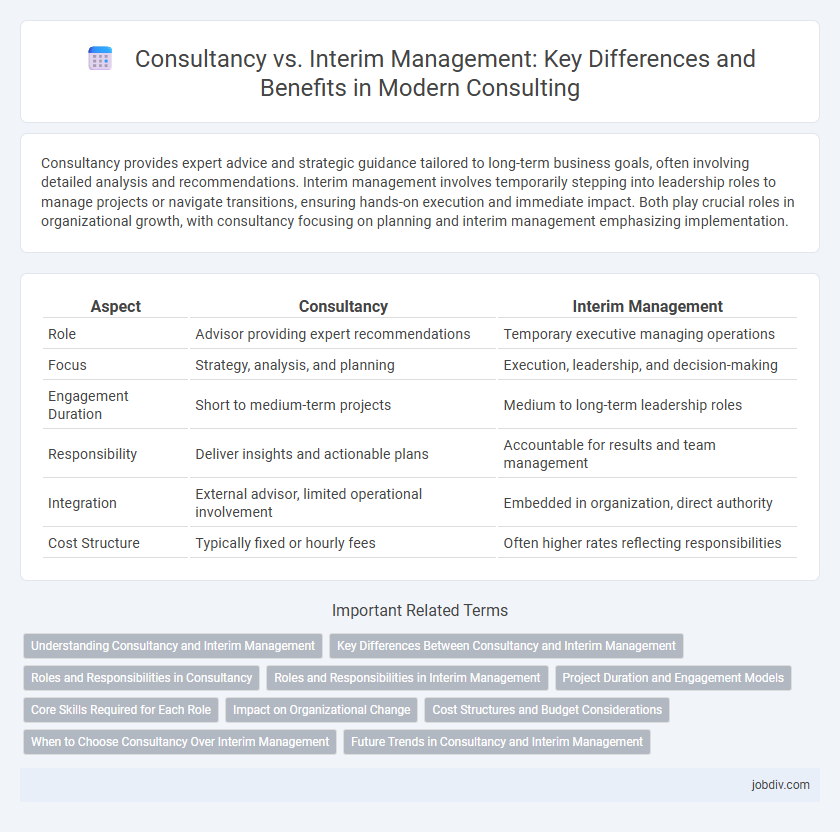Consultancy provides expert advice and strategic guidance tailored to long-term business goals, often involving detailed analysis and recommendations. Interim management involves temporarily stepping into leadership roles to manage projects or navigate transitions, ensuring hands-on execution and immediate impact. Both play crucial roles in organizational growth, with consultancy focusing on planning and interim management emphasizing implementation.
Table of Comparison
| Aspect | Consultancy | Interim Management |
|---|---|---|
| Role | Advisor providing expert recommendations | Temporary executive managing operations |
| Focus | Strategy, analysis, and planning | Execution, leadership, and decision-making |
| Engagement Duration | Short to medium-term projects | Medium to long-term leadership roles |
| Responsibility | Deliver insights and actionable plans | Accountable for results and team management |
| Integration | External advisor, limited operational involvement | Embedded in organization, direct authority |
| Cost Structure | Typically fixed or hourly fees | Often higher rates reflecting responsibilities |
Understanding Consultancy and Interim Management
Consultancy involves providing expert advice and strategic solutions to organizations aiming to improve performance and resolve specific challenges. Interim Management entails temporarily placing experienced professionals within a company to lead projects or manage departments during transitions or crises. While consultancy focuses on analysis and recommendations, interim management emphasizes hands-on leadership and execution.
Key Differences Between Consultancy and Interim Management
Consultancy typically involves providing expert advice and strategic recommendations to improve business performance, while interim management entails temporarily filling a leadership role to execute decisions and manage operations directly. Consultants focus on analysis and guidance without direct responsibility for implementation, whereas interim managers take hands-on control and accountability for delivering results. The key difference lies in the level of authority and responsibility assumed, with interim managers embedding within the organization versus consultants maintaining an external advisory position.
Roles and Responsibilities in Consultancy
Consultancy primarily involves providing expert advice, strategic insights, and problem-solving frameworks to improve organizational performance. Consultants analyze business challenges, develop tailored recommendations, and support implementation through knowledge transfer, but they do not engage in day-to-day operations. Their role centers on delivering specialized expertise to enable informed decision-making and drive long-term growth.
Roles and Responsibilities in Interim Management
Interim Management involves taking on executive roles with direct accountability for decision-making, operational leadership, and delivering business results during transitional periods. Interim managers implement strategic changes, manage teams, and ensure continuity, contrasting with consultancy which primarily provides expert advice and recommendations. The hands-on responsibility and authority to execute plans define the core of interim management roles.
Project Duration and Engagement Models
Consultancy engagements typically involve short to medium-term projects focused on strategic advice and specific deliverables, often lasting from a few weeks to several months. Interim Management assignments span medium to long-term durations, embedding experienced professionals directly within organizations to manage ongoing operations or transitional phases. Engagement models differ as consultancy usually operates on a project basis, while interim management requires full-time integration into the client's leadership team for sustained periods.
Core Skills Required for Each Role
Consultancy requires strong analytical skills, strategic thinking, and expertise in problem-solving to provide actionable recommendations that drive business improvements. Interim management demands leadership abilities, adaptability, and hands-on operational experience to manage teams and execute change effectively during transitional periods. Both roles require excellent communication skills but differ in their application: consultants advise and influence, while interim managers lead and implement.
Impact on Organizational Change
Consultancy provides expert analysis and strategic recommendations that guide organizational change by identifying gaps and designing tailored solutions, enabling sustainable transformation. Interim management delivers hands-on leadership by temporarily filling critical roles, directly implementing change initiatives and managing transition processes. The combined use of consultancy for diagnosis and interim management for execution significantly enhances the speed and effectiveness of organizational change.
Cost Structures and Budget Considerations
Consultancy services typically involve fixed or project-based fees focused on strategic advice, allowing for predictable budget planning, while interim management often incurs higher daily or monthly rates due to the hands-on leadership provided during transitions. Cost structures in consultancy emphasize deliverables and outcomes, which can reduce long-term expenditure, whereas interim management demands ongoing investment in senior talent to maintain operational continuity. Budget considerations must weigh the immediate financial impact against the value of expertise duration and organizational stability.
When to Choose Consultancy Over Interim Management
Choose consultancy over interim management when organizations require expert analysis, strategic planning, or specialized advice without the need for ongoing operational leadership. Consultancy is ideal for addressing specific challenges, implementing new initiatives, or gaining insights from industry experts without committing to a temporary executive role. This option suits projects demanding flexibility, external perspectives, and objective recommendations rather than continuous hands-on management.
Future Trends in Consultancy and Interim Management
Future trends in consultancy emphasize advanced data analytics, AI integration, and sustainable business practices, driving clients towards predictive insights and long-term growth strategies. Interim management continues to evolve with increasing demand for agile, short-term leadership solutions that address rapid change and digital transformation within organizations. Both fields are converging on hybrid models, combining strategic consultancy with hands-on interim execution to deliver measurable impact and resilience in volatile markets.
Consultancy vs Interim Management Infographic

 jobdiv.com
jobdiv.com